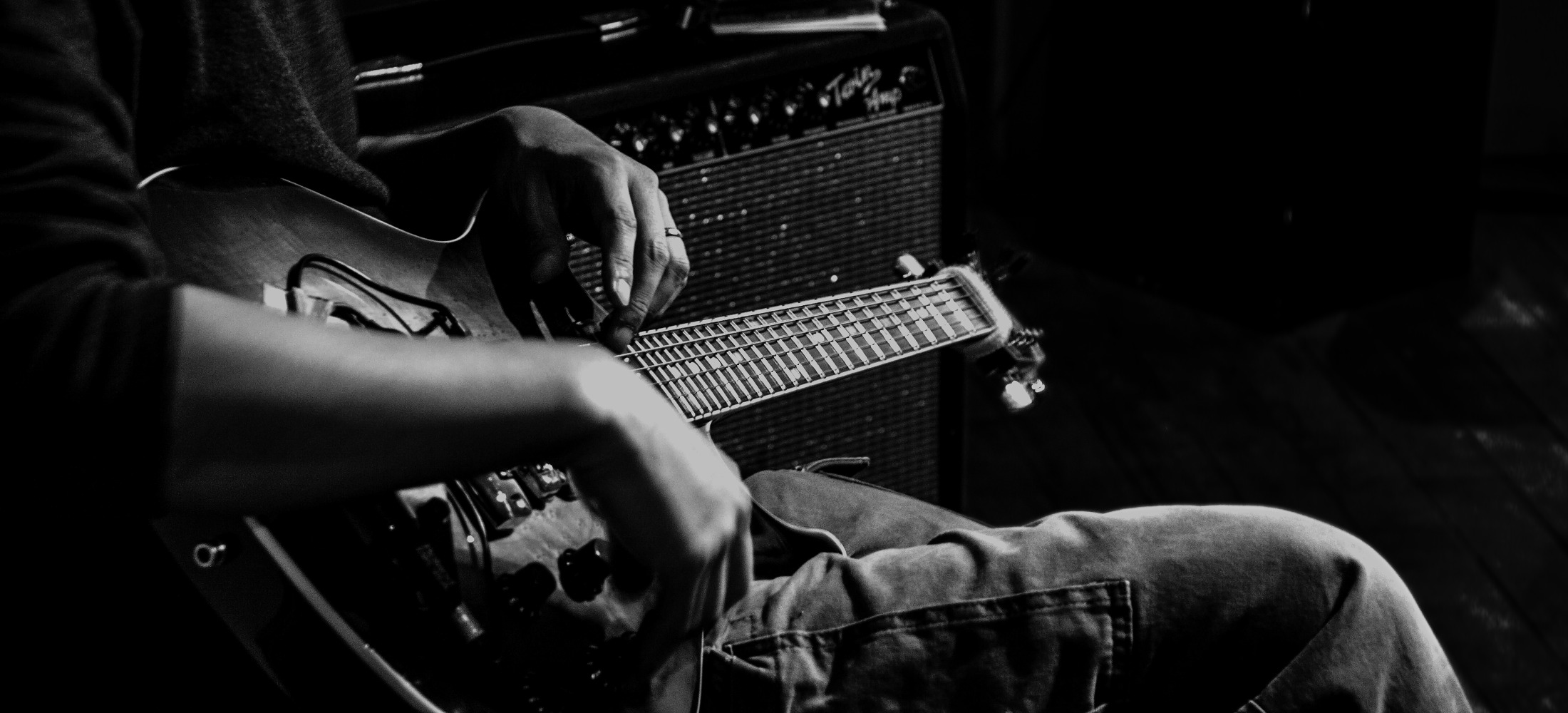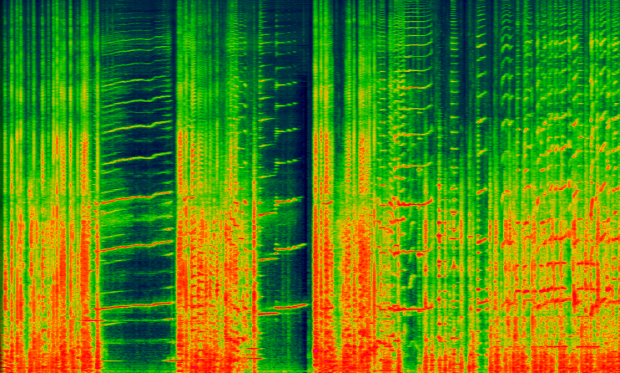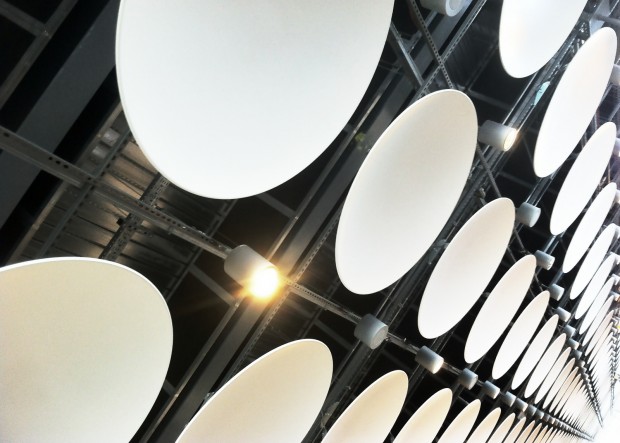 Tomorrow (Thursday, March 13, 2014) at 1:10pm: a performance by Han-earl Park (guitar) with Justin Yang (saxophones) and Caroline Pugh (voice) takes place at the Sonic Lab, (Sonic Arts Research Center, Queen’s University, Belfast, N. Ireland) [map…]. Free admission. Here’s the program:
Tomorrow (Thursday, March 13, 2014) at 1:10pm: a performance by Han-earl Park (guitar) with Justin Yang (saxophones) and Caroline Pugh (voice) takes place at the Sonic Lab, (Sonic Arts Research Center, Queen’s University, Belfast, N. Ireland) [map…]. Free admission. Here’s the program:

And at 1:00pm today (Wednesday, 12 March), Han-earl Park will be giving a seminar presentation at the Sonic Lab.
performance: Han-earl Park, Mike Pride and Catherine Sikora at Spectrum, New York

Wednesday, April 2, 2014, at 9:30pm: a performance by Han-earl Park (guitar), Mike Pride (drums) and Catherine Sikora (saxophones) takes place at Spectrum (121 Ludlow Street, Floor 2 (ring bell for 2), New York, NY 10002) [map…]. $15 ($10.00 students and seniors).
See the performance diary for up-to-date info. [Spectrum calendar…]
unnecessary blurb
Of all the ways to practice, structure or perform music, why might we choose improvisation? There’s no right answer to this question, but addressing it may help us to… a real-time, interactive improvisative meeting of guitarist Han-earl Park, drummer Mike Pride, and saxophonist and Catherine Sikora, the performance… nomadic tribes of Acirema… “Would it be fair to say ‘invaluable insight’?” “Of course not,” she replied, “it’s never fair….” And yet there’s always this….
Click….
On his returning to New York, Park sees an… “but they’re missing something essential, because the planes don’t land…” runaway winners… and as the only drummer to have performed with both… embrace a wide spectrum… Sikora, far too generous to be performing with… “pushes the boundaries, or plushes the boundaries…?” the asymmetrical soft-clipping stage which consists of the the diodes tied back-to-back in the feedback path of the… and as Eco may have asked: bad dream or bad simulation…? Canada’s 5 feet and 6 inches… as far as it goes.
about the performers
Improviser, guitarist and constructor Han-earl Park has been crossing borders and performing fuzzily idiomatic, on occasion experimental, always traditional, open improvised musics for over fifteen years. He has performed in clubs, theaters, art galleries, concert halls, and (ad-hoc) alternative spaces in Austria, Denmark, Germany, England, Ireland, The Netherlands, Scotland and the USA.
Park is part of Mathilde 253 with Charles Hayward and Ian Smith, Eris 136199 with Nick Didkovsky and Catherine Sikora, and Numbers with Richard Barrett. He is the constructor of the machine improviser io 0.0.1 beta++, a project performed in coalition with Bruce Coates and Franziska Schroeder. He has recently performed with Ishmael Wadada Leo Smith, Paul Dunmall, Lol Coxhill, Mark Sanders, Gino Robair, Tim Perkis, Pat Thomas, Andrew Drury, Josh Sinton, Dominic Lash, and as part of ensembles led by Wadada Leo Smith, Evan Parker, and Pauline Oliveros. Festival appearances include Freedom of the City (London), Sonorities (Belfast), Sonic Acts (Amsterdam), dialogues festival (Edinburgh), and CEAIT (California). His recordings have been released by labels including Slam Productions and Creative Sources.
Park taught improvisation at the UCC Department of Music, and founded and curated Stet Lab, a space for improvised music in Cork.
Born and raised in Southern Maine, but based out of New York City since 2000, Mike Pride currently leads From Bacteria To Boys, and the 7-drummer installation-band Drummer’s Corpse. Both record for AUM Fidelity. Pride is renowned for his ability to excel in a wide range of genres and ensembles. He has worked with everyone from improvised music icon Anthony Braxton to punk legends Millions Of Dead Cops, toured extensively on four continents and appeared on more than 85 recordings.
A short list of his collaborators includes Mick Barr, Boredoms, Eugene Chadbourne, Nels Cline, Andrew D’Angelo, Trevor Dunn, Dynamite Club, Peter Evans, Milford Graves, Mary Halvorson, Curtis Hasselbring, Nona Hendryx, Jon Irabagon, Haino Keiji, Kirk Knuffke, George Lewis, Bill McHenry, Tony Malaby, Sam Mickens, Butch Morris, Joe Morris, William Parker, Matana Roberts, Herb Robertson, Jamie Saft, Sonny Simmons, Jason Stein, Nate Wooley, and Otomo Yoshihide.
Pride’s versatility doesn’t end with his eclectic résumé as a popular sideman and leader/co-leader of many active ensembles spanning the worlds of modern-jazz, avant-rock, noise and doom metal improv. He is also a busy educator and clinician, a soundtrack composer for TV shows, video games and independent films, and an experienced and exhibited visual artist.
Since making her way to New York City from West Cork, Ireland to study abstract improvisation, Catherine Sikora has become a well-known face and sound in New York creative music circles. She has worked with Elliott Sharp, Eric Mingus, Michael Evans, Matt Lavelle, Jeremy Bacon, François Grillot and Burnt Sugar The Arkestra Chamber, among many others. Her undeniably unique approach sets her apart from everyone else, even when surrounded by the most original and creative voices in New York City. Sikora is a contributing writer to the book “Silent Solos-Improvisers Speak” (Buddy’s Knife Publishing, Köln, DE) and is currently working on producing a solo recording.
performance: Han-earl Park with Justin Yang and Caroline Pugh at Sonic Arts Research Centre, Belfast

Thursday, March 13, 2014, at 1:10pm: a performance by Han-earl Park (guitar) with Justin Yang (saxophones) and Caroline Pugh (voice) takes place at the Sonic Lab, (Sonic Arts Research Center, Queen’s University, Belfast, N. Ireland) [map…]. Free admission.
Han-earl Park will also be giving a seminar presentation on the previous day (Wednesday, 12 March), 1:00pm at the Sonic Lab.
See the performance diary for up-to-date info. [SARC page…] [Program (PDF)…]
Work in progress…
performance diary 01-22-14 (Belfast, New York)
| date | venue | time | details |
|---|---|---|---|
| March 13, 2014 | Sonic Arts Research Center Queen’s University Belfast, N. Ireland |
1:10pm | Performance by Han-earl Park (guitar) with Justin Yang (saxophones) and Caroline Pugh (voice). Han-earl Park will also be giving a seminar presentation on the previous day (Wednesday, 12 March), 1:00pm at the Sonic Lab. Free admission. [Details…] [SARC page…] [Program (PDF)…] |
| April 2, 2014 | Spectrum 121 Ludlow Street Floor 2 (ring bell for 2) New York, NY 10002 |
9:30pm | Performance by Han-earl Park (guitar), Mike Pride (drums) and Catherine Sikora (saxophones). $15 ($10 students and seniors). [Details…] |
| 2014– | Europe | I am based in Europe as of 2014, and I am seeking performance opportunities for, in particular, my Europe-based projects including Numbers (with Richard Barrett), Mathilde 253 (with Charles Hayward and Ian Smith). Interested promoters, venues and sponsors, please get in touch! |
| September–October 2014 | Europe | Eris 136199 (Nick Didkovsky, Han-earl Park and Catherine Sikora) is seeking performance opportunities late-September and October 2014. Interested promoters, venues and sponsors, please get in touch! |
Continue reading “performance diary 01-22-14 (Belfast, New York)”
video: Gowanus Company at Douglass Street Music Collective, Brooklyn
Scott Friedlander has uploaded video recordings of Gowanus Company (November 26, 2013). As I wrote previously:
Big, heart-felt thanks to Kyoko and Josh for organizing the event. I’m touched, and could not have asked for a better send-off. Thanks to everyone who made music, and for creating that welcoming, friendly vibe. (And a particular pleasure to finally perform with Kyoko, Ken and Fay!) And thanks again to Scott Friedlander for the documentation.
From that vocal/guitar chorus (Kyoko, Viv, Fay, Nick and I) to the jazz racket of Ken and I joined by Tom and Ingrid… my spirits have been lifted!
Gowanus Company was curated by Kyoko Kitamura, Josh Sinton and Han-earl Park. Performers were Dan Blake (saxophones), Olie Brice (double bass), Viv Corringham (voice), Nick Didkovsky (guitar), Michael Evans (drums), Ken Filiano (double bass), Christopher Hoffman (’cello), Jason Kao Hwang (violin), Kyoko Kitamura (voice), Ingrid Laubrock (saxophone), Jeremiah Lockwood (voice and guitar), Russ Lossing (piano), Han-earl Park (guitar), Tom Rainey (drums), Josh Sinton (saxophone) and Fay Victor (voice). [Details…]
Happy New Year: 2014
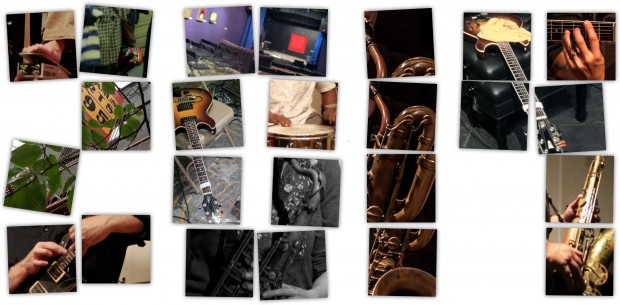
farewell, Brooklyn, it’s been a blast
Let’s start with a kind of personal Top Ten. In no particular order: Han-earl Park with Ingrid Laubrock; with Tim Perkis and Harris Eisenstadt; as part of Eris 136199 with Nick Didkovsky and Catherine Sikora; with Louise Dam Eckardt Jensen and Michael Evans; Gerald Cleaver; Tom Blancarte; Dominic Lash; Catherine Sikora and Josh Sinton; and with Evan Parker, Brooklyn and New York, 2012–2013. Videos by Scott Friedlander, Don Mount and Kevin Reilly.
I moved to Brooklyn back in December 2011, and I’m grateful and privileged to have been part of, even briefly, such a gracious, vibrant, creative, fun and welcoming community.
I’m particularly indebted to Andrew, Jesse, Michael, Adam, Anna and Andrea for introducing me to the (cultural) geography/neighborhood(s); to Bruce, Wadada and Ras who gave me my first few gigs; and to Tim and Evan for offering me sideman gigs. And a very big thanks to Josh, Catherine and Nick for much of the above, and for collaborating on some long-term projects. To everyone, I hope to repay the your generosity (and hope to catch up when I’m back in Brooklyn/NYC).
Now back in Cork, and, for what feel like the first time in a long time, I’m arriving without a gig in town (and, to my surprise, I’m not too unhappy about that). Some plans ahead (solo performance at SARC for starters), fingers crossed, something will work out.
Anyway, as posted earlier, I’m seeking performances for Numbers (Richard Barrett and Han-earl Park), Eris 136199 (Nick Didkovsky, Han-earl Park and Catherine Sikora) and Mathilde 253 (Charles Hayward, Han-earl Park and Ian Smith). Interested promoters, venues, festivals and sponsors, please get in touch! [Details…]
Free Jazz: Catherine Sikora, Han-earl Park and François Grillot, ‘Tracks in the dirt’
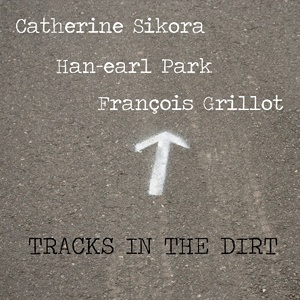
Paul Acquaro at Free Jazz Blog writes that Catherine Sikora, Han-earl Park and François Grillot’s Tracks in the dirt (Clockwork Mercury Press 003) is an “enjoyable listen for open ears”, and that “chance encounters and smart musical ideas that make this recording so effective.”
The opening track, ‘Helix’ contains some of my favorite moments of the recording. Sikora’s soprano sax sounds like it is drawing a line from each hit of the bass, with Park coloring in the spaces between. Park, with whom she also released Cork 04-04-11, is an understated and sympathetic accompanist throughout.
Feel the force of Sikora’s playing too—halfway through the second track, ‘The Chopping Block’ her soprano is clear and cutting, the melodic lines spinning and swirling around Park’s textures and Grillot’s rhythmic pulse. [Read the rest…]
[More about this recording…] [All reviews…]
Also by Catherine Sikora and Han-earl Park
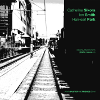
Sikora-Smith-Park (Cork, 04-04-11) [details…]
Performers: Catherine Sikora (saxophone), Ian Smith (trumpet) and Han-earl Park (guitar).
(cc) 2012 Catherine Sikora/Ian Smith/Han-earl Park.
seeking performances (Europe, 2014)
I will be moving back to Cork this month, and I am seeking performances for the following projects/ensembles in Europe, 2014. Interested promoters, venues, festivals and sponsors, please get in touch!
- Numbers: Richard Barrett (electronics) and Han-earl Park (guitar). Berlin/Cork-based. [About this duo…]
- Eris 136199: Nick Didkovsky (guitar), Han-earl Park (guitar) and Catherine Sikora (saxophones). New York/Cork-based. Seeking gigs in September/October 2014 in particular; contact me for other dates. [About this ensemble…]
- Mathilde 253: Charles Hayward (drums, percussion and melodica), Han-earl Park (guitar) and Ian Smith (trumpet and flugelhorn). London/Cork-based. [About this ensemble…]
In addition, I (Han-earl Park) will be available for performances in solo or (ad-hoc) ensemble contexts.
Contact me for further information, audio recordings, etc. (some material only available to promoters).
thanks: Gowanus Company at Douglass Street Music Collective, Brooklyn
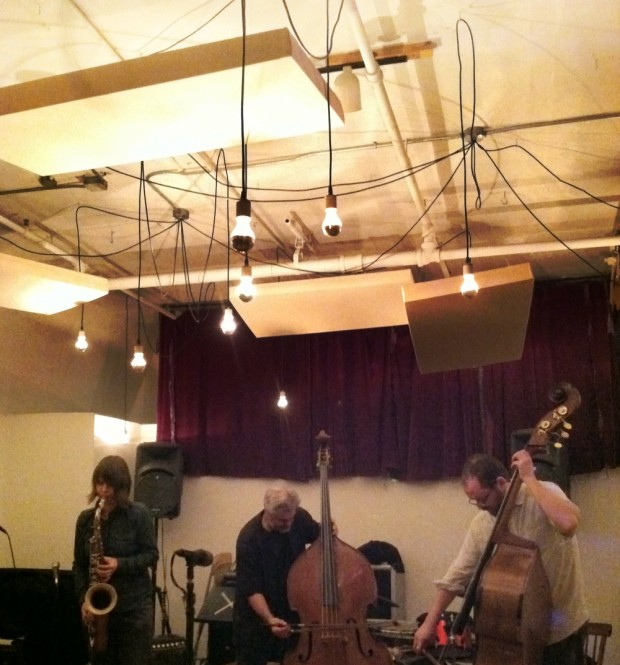
I’m honored to have been part of a fantastic iteration of Gowanus Company (November 26), and feel enormously blessed to have been welcomed into such an incredible community. Big, heart-felt thanks to Kyoko and Josh for organizing the event. I’m touched, and could not have asked for a better send-off. Thanks to everyone who made music, and for creating that welcoming, friendly vibe. (And a particular pleasure to finally perform with Kyoko, Ken and Fay!) And thanks again to Scott Friedlander for the documentation.
From that vocal/guitar chorus (Kyoko, Viv, Fay, Nick and I) to the jazz racket of Ken and I joined by Tom and Ingrid… my spirits have been lifted!
reminder: Gowanus Company at Douglass Street Music Collective, Brooklyn
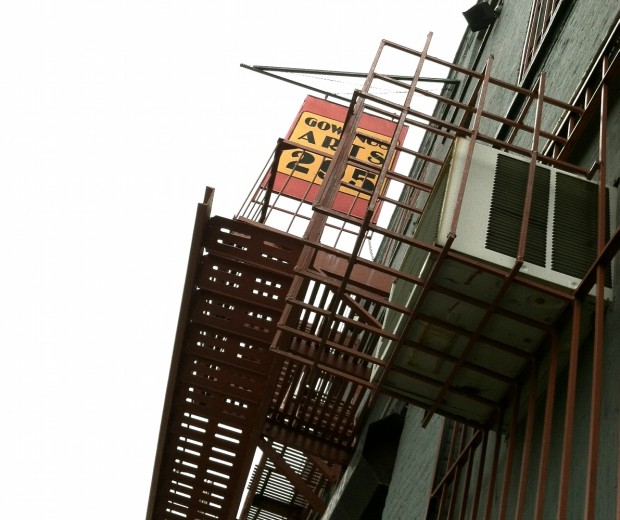
This Tuesday (November 26, 2013), at 7:00pm: My last gig in Brooklyn before the Big Move!
In the spirit of Derek Bailey’s Company week, the evening will feature a series of never-before-seen and never-to-be-seen-again groups. [Read the rest…]
Gowanus Company with Dan Blake (saxophone), Olie Brice (double bass), Viv Corringham (voice and electronics), Nick Didkovsky (guitar), Michael Evans (drums), Ken Filiano (double bass), Christopher Hoffman (’cello), Jason Kao Hwang (violin), Kyoko Kitamura (voice), Ingrid Laubrock (saxophone), Jeremiah Lockwood (voice and guitar), Russ Lossing (piano), Han-earl Park (guitar), Tom Rainey (drums), Josh Sinton (saxophone and clarinet), Fay Victor (voice) and others takes place at Douglass Street Music Collective (295 Douglass Street, Gowanus, Brooklyn, NY 11217) [map and directions…]. $10 suggested donation.
